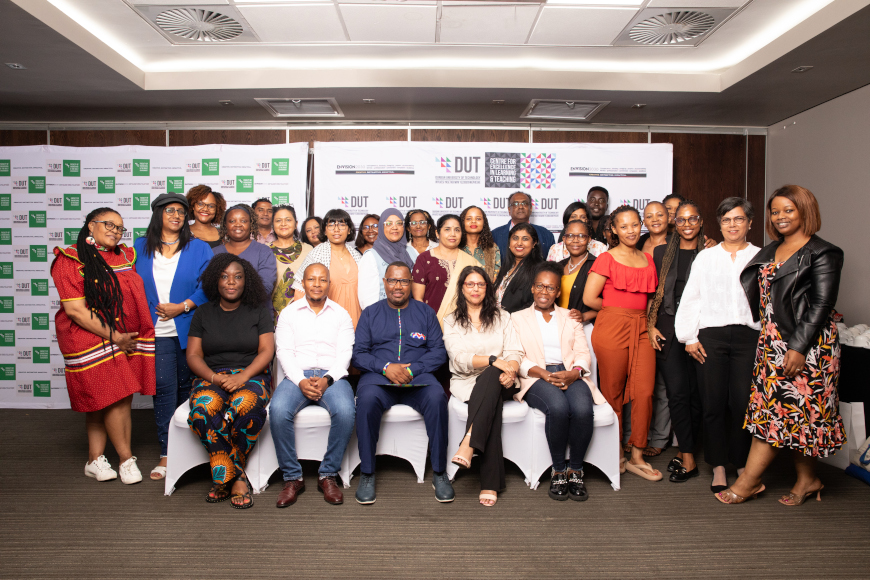The Durban University of Technology’s (DUT’s) Centre for Excellence in Learning and Teaching (CELT) in collaboration with the Department of Electronic and Computer Engineering recently hosted a 3 day Decoloniality Symposium. The symposium coordinated by Mrs Nalini Chitanand (Academic Development Practitioner at CELT) and Professor Moholo Tsoeu (HoD: Electronic and Computer Engineering) was held as a hybrid event with in-person engagement at the Coastlands Hotel in Musgrave and online participation on MS Teams.
Welcoming the DUT colleagues and guests on the first day of the symposium was Dr Shoba Rathilal, acting Director of CELT, which is responsible for Staff and Curriculum Development, Student Development, eLearning, Online Distance Learning, Earmarked Grants and Strategic Projects in Learning and Teaching. She said that the collaboration from CELT and science is something that is needed in Decoloniality workshops. “I support the initiative of the units coming together with a deliberate focus in science, engineering, and technology. I look forward to this deliberation and to colleagues, we are looking for engagement and I am hopeful that you are all going to participate,” she said. Opening remarks, background to the event and the introduction of the guest facilitator was done by Mrs Chitanand and Prof Tsoeu.
Prof Emmanuel Mgqwashu, the Director of the Centre for Higher Education Professional Development (CHEPD) at North West University (NWU), was the guest facilitator for the first two days and focused his presentation and discussions on Democratising learning for epistemic access: a view from a decolonial lens. He commenced the discussions by providing statistical data on where we are as a higher education sector in South Africa with respect to students’ success and graduation rates and drawing attention to the aging professoriate, new generation of academics in higher education, and the increase in PhD studies. Also part of the context was a discussion on the Gen Z students in higher education, artificial intelligence and the digital environment and its influence on pedagogy and andragogy. Following the overview of the context Prof Mqqwashu facilitated a discussion on how we have responded as a higher education sector, why a decolonial lens on democratising learning, the ‘place’ of language in a decolonial project and a decolonial lens of learning. He further explained that we cannot teach the world with one worldview which is the western. “Western hegemony has taken the responsibility of saving us all, it is just one worldview trying to solve problems for all of us but we also have our own African, Indian and Eastern knowledges,” he added.
Critical discussions ensued on the moral/political (axiological) focus of higher education versus the knowledge (epistemological) focus, the inequities that persist in the system, and the need for a decolonial lens on learning. The latter part of day one focused on group discussions centred on four themes: recognising and challenging colonialism, striving for social justice and inclusion, embracing cultural heritage and interrogating knowledges and exploring alternatives. Faculty groups interrogated and discussed the theories that have shaped disciplines.
On the second day of the symposium, faculty group activities focused on democratising learning from a decolonial lens. Participants had the opportunity to use a decolonisation wheel tool provided by Prof Mgqwashu to interrogate their disciplines and programmes.
The third day of the symposium commenced with a presentation from Prof Nyasha Mboti, Head of the Department of Communication Science at the University of the Free State. His presentation entitled, The 10th Province as an Analytical Framework drew on an Apartheid Studies framework to understanding the problem of living with harm and living on harms way.
He then said if poverty, harm, and inequality persist, then what is really going on. “Many people tend to talk about decoloniality only in terms of metaphors. I want us to come up with specific indicators so that we can tell if Apartheid persists in 2023,” he said. He provoked participants to reflect on the contradictions in our lives.
The final segment for day 3 was a panel discussion with DUT staff. Facilitated by Nalini Chitanand and Bwalya Lungu, DUT staff Dr Kunle Oparinde, Ms Nisha Naidoo, Dr Sasi Gangiah, Ms Mirriam Siluma and Dr Adarsh Puri shared their perspectives and practices on decolonising efforts in their various sectors and disciplines. This included insights into decolonising research, hospitality programmes, child and youth care and decolonisation initiatives for inclusivity in the research laboratories in applied sciences.
Nalini Chitanand and Bwalya Lungu closed the event by thanking all participants, guest presenters, organisers of the event and acting Director: CELT and discussed with participants possible ways forward for DUT. The latter included a podcast series that will be developed, regular conversations, a decolonial hub, an online space and sharing of resources.
The event concluded with lunch and a networking session.
Pictured: DUT academic staff and guests at the event. (Photography:DUT ( Multimedia)
Patience Makhaye

